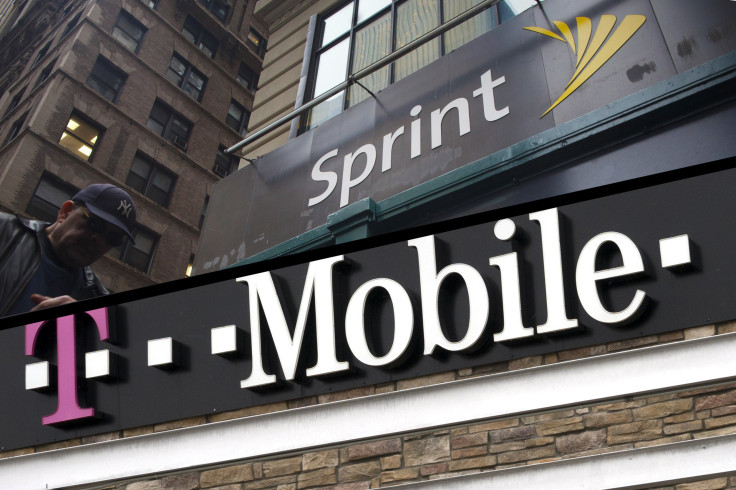Sprint And T-Mobile Go Solo: Can The Wireless Minnows Survive Big Fish Verizon And AT&T?

Sprint Corp.’s (NYSE:S) bid to acquire T-Mobile US Inc. (NYSE:TMUS) is now dead in the water, leaving the respective carriers to fend for themselves among growing competition in the mobile telecommunications market. With a prospective deal out of the way, the question now is what’s on the table for the number three and number four wireless carriers.
In opposing the prospective deal, the Federal Communications Commission determined that preserving four wireless competitors was the best thing for the marketplace. But Walter Piecyk, analyst at BTIG Research, argues that two weakened competitors, at a huge disadvantage against Verizon and AT&T, won't help consumers in the long run.
"I think it's bad news for consumers in the long term, because Sprint and T-Mobile will be more challenged to sustain their competition over a longer period of time against the dominant players, AT&T and Verizon,” Piecyk said.
In the short-term, consumers could benefit from a price war as both cut prices in a heightened battle for new subscribers. “I think in the short term, when you look at what’s going on, it does provide price pressure, it does keep the big guys in check,” said Joe Hoffman, analyst at ABI Research.
Sprint and T-Mobile have single-product businesses in the U.S., while Verizon and AT&T are able to bundle home phone, broadband, wireless and, in some markets, TV. Soon, they'll have the infrastructure in place to offer TV across the country, delivered even to wireless devices. T-Mobile currently has more than 50 million subscribers, with Sprint slightly ahead with 53 million. By comparison, Verizon has 104 million subscribers with AT&T reporting 116 million.
Sprint, in particular, has a long way to go to bring its network up to the standard of its competition. “Sprint has to really improve its network,” said Recon Analytics analyst Roger Entner. “It has the most spectrum of any U.S. carrier and has to now bring that asset to bear.”
To continue developing its infrastructure, Sprint will have to continue receiving outside investment from its parent company, Japan’s Softbank (TYO:9984), Hoffman said.
Yet, even if Sprint manages to complete its infrastructure upgrades, it will need to deal with differentiating itself from the growing competition in the market.
“Sprint has to change the rules of the game just like T-Mobile has -- and has to shake up the market, attract customers and grow,” Entner said. “It has to get the fundamentals right which is good network.”
Some analysts believe Sprint and T-Mobile will be able to grow despite the lack of a merger. “If they stayed separate, they can be smaller competitors, but still be rapidly growing,” said telecommunications industry analyst Jeff Kagan.
Kagan noted that T-Mobile’s Un-carrier initiative has helped boost the network into rapid subscriber growth. While Sprint faces challenges growing its subscriber base, Kagan believes that the completion of Sprint’s network upgrades will prove essential to its growth in the long term. “Once those [upgrade] issues are solved, they should be able to start growing rapidly,” Kagan added.
Others don’t think that Sprint’s growth is as clear cut. If T-Mobile outflanks Sprint on price, Sprint needs to find a way to define its value in the marketplace. “Particularly, if T-Mobile gets a new owner that tries to be a price leader, Sprint really needs to focus on being a value leader in the U.S. Market,” said Strategy Analytics analyst Susan Welsh de Grimaldo.
With Sprint out of the way for now, foreign companies such as Iliad S.A. (EPA:ILD) are looking to T-Mobile as a way into the U.S. wireless market. “There may be other buyers out there,” Grimaldo said. “T-Mobile’s ownership structure could shift at the end of the year or at least be in the works.”
As for Sprint's and T-Mobile's attempt to jointly bid on wireless spectrum from the Federal Communications Commission, analysts didn’t see the failed venture as much of an issue, noting that Sprint owns the rights to more spectrum than any of the other four wireless carriers.
Is the wireless more stable and competitive with four major players than three? Hoffman looks back to a groundbreaking Boston Consulting Group study from 1976: "When you get a stable market, or vendor phase, there tends to be about three companies and the third place company is one fourth the size of the leading company," Hoffman said.
© Copyright IBTimes 2025. All rights reserved.






















